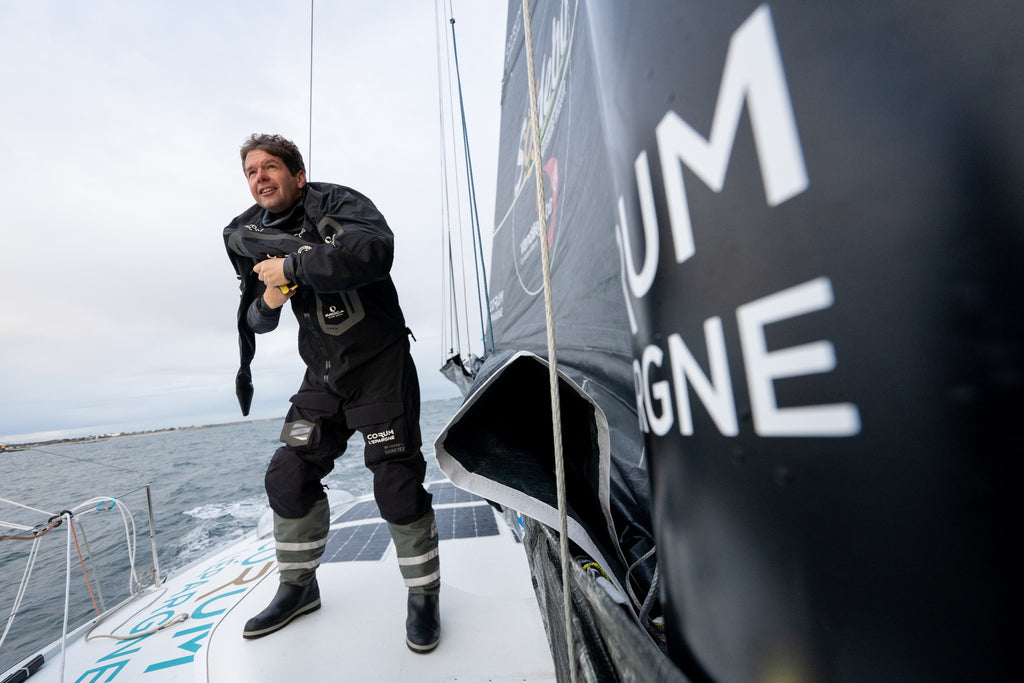Nicolas Troussel is about to set out on a lifetime goal. Sailing the most famous non-stop solo round the world race and navigating some of the world’s most challenging waters.
THE VENDÉE GLOBE
A fabled race familiar to most hardcore sailors, the Vendée Globe was inspired by the 1968 Golden Globe race, when 9 sailors hit the high seas for 313 days at sea.
It took just over 20 years for it to make its second appearance under the name of the Vendée Globe when another brave set of sailors took off on the course. 13 boats departed that year, from Les Sables-d’Olonne.
Since 1989, 167 sailors have attempted the course. 89 have been able to cross the finish line. The record? 74 days - a standard set in the last running of the course in 2016.
Now, the important word to focus on is ‘sailor’ - not ‘team’. Because beyond one of the most challenging routes on the race circuit, the entire haul is done solo. One skipper. One boat and no stepping foot on shore until they’re back at the finish line.
Circumnavigating the three capes—Good Hope, Leeuwin, and Horn—it demands the skippers complete 40,075km (21,638 miles). Which, to no surprise, takes a certain mindset, will, focus, and skillset to take on this prolific course.

Photo: Eloi Stichelbaut / polaRYSE / CORUM L’Épargne
NICOLAS TROUSSEL’S FOCUS, PLANNING + PREPARATION
This year, Nicolas Troussel is about to step up to the start line of a race he’s had in his sights for nearly 15 years.
“After winning my first Solitaire du Figaro back in 2006, I felt like my next challenge would be to take on this incredible race that is the Vendée Globe. It’s been my ultimate dream of mine. Now I have the opportunity to achieve this with CORUM L’Épargne, and a state of the art, new generation boat, that has been specifically designed for this race.”
Though an experienced and decorated solo sailor, and with over 11,000 nautical miles logged as preparation and training for this race, there are still elements of the course that will present new waters and new challenges for Nicolas.
“I’ve never been in the Southern Ocean… I’m very curious about it for sure but I will be approaching it with a lot of humility.”
Known in the sailing scene as the most treacherous and relentless ocean of them all, with towering waves, freezing winds, and big storms. Nicolas is taking on this new challenge—and doing so with a healthy amount of humility—is a huge test for him as a sailor.

Photo: Mattieu Hacquebart / CORUM L’Épargne
Taking on that kind of challenge backed by a team is tough enough. The fact he’ll be doing it solo is a whole other demand on his physical, mental and emotional game.
“As a team, we have used the time we had as efficiently as we could...personally, I feel like I’ve been preparing for this for more than 14 years, so I’m fully focused!”
He’ll apply that focus from the first push off the start line, through every challenge, and onto the finish line. His way to tackle the grittiest moments?
“I tell myself that we [ the competitors] are all facing the same conditions, we are in the same race, the same seas, I’m not alone in that respect”.
Beyond the situations posing obvious physical challenges (think freezing temperatures, unpredictable waves, and the possibility of technical failures the skippers have to handle themselves), there’s the fact that he’ll be completely solo for as long as it takes him to complete the race.
And while the world’s had its own taste of turning inward with varied levels of lockdown, due to 2020’s COVID-19 pandemic, this is a whole different experience.
To Nicolas, it’s about choice:
“[Dealing with the isolation is] not too bad. I think the key difference is that I choose to sail solo around the world; it’s not something that I’ve been told to do. I often communicate by email with my family, and my team and I’ve downloaded a lot of podcasts to help me escape mentally”.

And being self-sufficient on board for around 3 months?
“A lot of pre-race organization and planning with the whole team.
One of the most important things to focus on while sailing, is creating energy. I’ll either use our engine, the solar panels on the roof, or 2 hydro generators. That energy is required to power the autopilot, all the navigation instruments, the computers, etc. It can’t be left to chance.
Then there’s water, I use a watermaker that removes the salt contained in the ocean, to create my drinking water. My food is either dehydrated or sterilized. Everything has been carefully calculated and prepared to enable me to be self-sufficient during the whole race.”
It’s a guarantee that the earliest sailors, who undertook this challenge, went to sea with different solutions on board. The technology that now supports the racers and is integrated into the boats themselves, is an impressive mark of the development of the sport.

Last time, in 2016-17, the winner arrived after 74 days at sea.I’m so impressed to see such a performance gain in less than 30 years. For this upcoming edition, the winner could finish the race in less than 70 days.”
That’s a serious change in speed potential - and seeing someone break the 70-day mark would be an incredible feat to witness, and celebrate, this year.
THE GEAR GOING AROUND THE GLOBE
He’s focused. He’s ready. He’s headed out to sea with processes and systems to back him up (like support from his team on shore), and the capacity to stay mentally calm when there’s chaos imminent (which, to Nicolas, is the most necessary response to stress while solo sailing).
This time around, he is also backed by Mustang Survival gear; kitted out from base layers to our most advanced waterprooof racing gear that will support him in any weather the course throws at him.
“When you’re sailing offshore in such a wild and changing environment, you need to have the right gear for any given situation. In that sense, the Mustang Survival gear is my best ally against salt, humidity and cold weather.”

Photo: Eloi Stichelbaut / polaRYSE / CORUM L’Épargne
Keeping his base and mid-layers dry on and below deck is a must. When he’s on deck, it’s all about keeping the elements out.
“The EP Lite Ocean Racing Smock is hands down my favorite piece of equipment right now. I never go on deck without it or my EP Ocean Racing Salopette and if it's freezing cold - then the full jacket goes on.”
You can shop Nicolas’ racing kit here, and get decked out in the same pieces he’s taking with him as he pushes his limits, and vies for a coveted spot in the finisher’s circle of this epic adventure.
The race kicks off on November 8, 2020. Stay up to date and track Nicolas’s voyage here.




